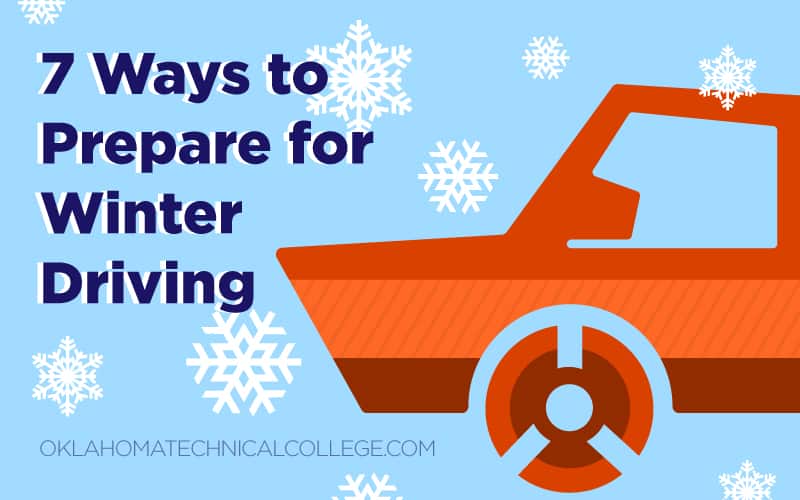7 Ways to Prepare for Winter Driving
The closer winter gets, the more dangerous it is while driving. Even if icy roads don’t pose a threat, the fact that winter weather brings much lower temperatures means you need to prepare yourself and your car for any challenge during the coming colder days. Check out these tips to help you prepare for the chilly driving months ahead.
- Carry a winter emergency kit.
The saying “Better safe than sorry” really applies when being faced with the coldest elements of winter weather. Keeping an extra pair of gloves, a coat, a hat and a blanket in your vehicle are essential during the winter months, even in Oklahoma. Things like an ice scraper, a flashlight with fresh batteries, an extra car charger, snacks you can keep in the glove box and any medication you might need are vital if you ever find yourself stranded for any length of time. A first-aid kit, flares and a bottle of water are other important items any adequate winter emergency kit should contain. Keep your winter emergency kit in the trunk or backseat in a plastic container or duffle bag for when the occasion arises.
- Check your antifreeze levels.
Coolant fluids that are not the proportionally correct mixture of water and antifreeze can either cause your engine to overheat or freeze due to dropping winter temperatures. Antifreeze testers to test the mixture are available at any auto parts store. They aren’t difficult to use. Checking all your fluids before it’s freezing outside is also a good idea, because no one wants to have to do that kind of thing in the dead of winter.
- Check your tires’ pressure and tread.
Tires act differently in winter, not just because of wintery rain and snow but because the colder temperatures put added pressure on them. For every 10 degrees the temperature drops, your car’s tire pressure decreases by 1-2 pounds. Check your tire pressure often to make sure they’re properly inflated. Driving in winter weather on deflated tires decreases your ability to control the car and increases the likelihood of a tire going flat. Both are bad things in freezing weather.
Your tires’ tread is important for keeping you on the road. If they are worn too thin, winter weather will make it too difficult to drive safely. Check your tires by using the tried-and true “Lincoln” test — stick a penny between the treads, with the top of the head pointed towards the tire. If you can see Lincoln’s entire head, it’s time for new tires. Slick roads due to snow or ice and worn tires make a deadly combination.
- Change your windshield wipers and the fluid to winter grade.
A dark winter night can be one of the worst times to drive, especially with snow storms and icy rain. The last thing you want is to have windshield wipers that don’t work properly and your fluid to be low or worse, empty or frozen. Change your wiper fluid to a winter formula fluid. It doesn’t freeze and is made to deal with colder rain and snow.
- Change your oil to winter grade (a lower viscosity).
The colder the weather gets, the thicker your engine’s oil becomes. It is more likely for a car to seize up during the winter months when the oil has become too thick. Winter-grade oil is thinner and allows the engine to remain properly lubricated during cold weather.
- Make sure your heater is working.
Winter often arrives without much of a warning, especially in Oklahoma. If that day comes and you discover your car’s heater isn’t working, it could be a few days before your mechanic takes a look at it. It could be a couple of pretty unpleasant rides to and from work until then, if you’re caught unprepared.
- Have the battery checked.
Cold air drains a car battery’s power like very little else. Keeping your car in a garage or a covered area is preferred during the winter months. For a lot of people, however, that isn’t always an option. If your drive to work is long enough, your battery may have enough time to charge itself. If it’s a short drive, however, warming the car up before or after your drive to work may be a good idea to keep it going during the winter.
Driving during winter doesn’t have to be dangerous if you take the proper precautions. If getting your car prepared or taking care of your loved one’s vehicles by following these and other tips is exciting to you, Oklahoma Technical College could help you develop your career.
To learn more about Oklahoma Technical College’s automotive program, request more info today or call us at 918-895-7500. We can’t wait to help you get started.
More on Automotive Technology:














